
When the word “sustainable tourism” first began to circulate in the travel community, a misunderstanding developed that sustainable also meant pricey. True, there are numerous luxury ecotourism resorts across the world that promise eco-friendly accommodations and low-impact excursions, but that’s only the tip of the iceberg.
The goal of sustainable travel is to strike a balance between the environmental, social, and economic components of tourism. This includes emphasizing local experiences, supporting environmental goals, reducing waste, boosting economic growth in places most impacted by tourism, and conserving resources.
Contrary to common opinion, sustainable travel does not have to be synonymous with luxury; in fact, sustainable travel is frequently less expensive. Supporting your host economy can provide a much more fulfilling experience and long-term employment for people, while conserving nature resources guarantees that future visitors can enjoy them as well.
Furthermore, sustainable travel methods can be used almost anyplace, whether you’re traveling around the world or just down the street. Here are ten simple strategies to save money while traveling sustainably.
Choose Accommodations that are Owned and Operated Locally
High-end resorts are usually always more expensive and inefficient, with rare exceptions. Instead, put your money directly into the pockets of locals by booking rooms at smaller, family-owned establishments such as B&Bs or even campers.
Don’t be hesitant to seek at hostels, which are more likely to be owned by locals and where you won’t be compelled to pay hefty resort fees. Just as you should examine the safety and quality of a hostel or local lodging before of time, you should also investigate their responsible tourism practices.
Visit Farmers’ Markets
Local farmers markets are every eco-conscious traveler’s dream. In just one stop, you can support family farmers and the local economy, eat healthier, and often save money. One of the indirect benefits of shopping at a farmers market is that it helps the environment because moving food over large distances releases more CO2. You save a lot of money by not eating out when you buy your own ingredients at a farmers market to create a couple of meals.
Prefer Public Transportation to Car Rentals
Car rentals are among the most expensive expenses on a holiday, and airport car rental desk fees are by far the most expensive. Add in the hidden fees and insurance charges, and you’re looking at a significant reduction in your vacation budget.
There are clearly situations where renting a car is important, but environmentally conscious visitors should constantly look for alternatives to reduce pollution by taking public transportation, renting bikes, or walking instead of driving. Another alternative is to rent a car for only a portion of your journey to save money, gas, and parking fees. To be prepared, do some study ahead of time on your destination’s public transportation and how to get around.
Shoulder Season Travel
We’re all familiar with the terms “high season” and “low season” in reference to vacation spots, but what about “shoulder season”? It turns out that there are many advantages to traveling during the shoulder season, which occurs between the busiest and slowest times of year. The worst weather occurs during a destination’s low season, whereas the high season sees a flood of visitors and, as a result, higher pricing.
Shoulder seasons are the greatest times to travel because the weather hasn’t typically changed and businesses are just starting to offer better prices. You can save money and help local businesses out during a slow season without adding to the crowds or stress on services during the high season.
Help to Protect Our Natural Areas
There are a ton of eco-friendly advantages to visiting a national park or wildlife preserve. As an added bonus, natural conservation zones typically have low admission prices (and some even offer discounted annual passes) and a low environmental impact.
By contributing to the organization’s conservation efforts with your entrance fee, you’ll be ensuring the park’s long-term survival. Animals should be directed toward verified wildlife sanctuaries with active programs of rehabilitation and release. The Association of Zoos and Aquariums is a good resource for finding accredited zoos and aquariums.
Spend More Time in One Location
The term “slow travel” describes a style of vacationing in which travelers spend more time at each location rather than racing from one to the next. The second choice may allow you to visit more landmarks, but it may not provide you with as fulfilling of a vacation. Travelers that rush from attraction to attraction risk contributing to the problems of over tourism and crowding that plague many of the world’s most popular tourist spots.
They may wind up spending more on transportation costs and more money at multinational chain stores than necessary. Conversely, tourists that stay in one place for an extended period of time are more likely to explore the area beyond the main tourist areas, so supporting the local economy.

Keep Close to Home
Consider staying closer to home for your next excursion, as local travel emits fewer emissions than foreign travel. Furthermore, overseas travels are expensive, so much so that we often plan and save for them for months or years. Visit a nearby little town or a local attraction you’ve always wanted to see instead;
it’s astonishing how many local beauties we neglect in favor of huge international vacations. It is less expensive, takes less time, benefits adjacent towns, and does not require passports or expensive visas. Perhaps most importantly, you may discover a new hidden gem.
Remember to Bring Your Reusables
Any frequent traveler will tell you that they’ve had to buy a $5 bottle of water at the airport at some point. Reusable water bottles, coffee cups, portable utensils, and cloth tote bags come in useful while shopping or eating out, and they also save you money on expensive single-use products when traveling.
Purchasing a refillable, reusable travel-sized container for cosmetics, beauty products, and bathroom supplies is also a good purchase for environmentally conscious travelers. You’ll also save money on single-use travel-size bottles, which contribute to plastic pollution.



